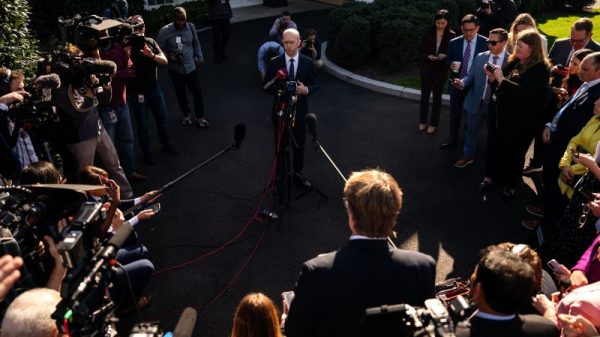A controversial fetal development video created by an antiabortion group is being pushed into American classrooms, with lawmakers in several states pursuing legislation mandating that Live Action’s “Baby Olivia” or another presentation like it be shown in schools.
North Dakota last year became the first state to pass such a bill, after a state senator opposed to abortion showed the three-minute video during a committee hearing. Similar legislation passed major legislative hurdles this week in Iowa and West Virginia, and bills have also been filed in Kentucky and Missouri. Although the details vary, each of the bills references “Baby Olivia,” a video that Live Action debuted in 2021 “to reveal the undeniable humanity of preborn children.”
The nonprofit group, which is against abortion in all cases, including those involving rape or incest, has said it wants “Baby Olivia” shown to students across the nation. Its leaders have played the animation to legislative audiences, such as during a side session at a conference held last year by the influential conservative American Legislative Exchange Council.
After the North Dakota law passed, Live Action founder Lila Rose described it as “just the beginning.”
“When people learn the truth about the humanity of children in the womb, and the barbaric procedures abortionists use to kill them, they change,” she said at the time, using inflammatory language embraced by some hard-liners in the antiabortion movement. “They become pro-life.”
Medical experts say the video is misleading because it mischaracterizes how soon fetuses exhibit certain traits and uses a timeline for pregnancy two weeks earlier than is typical. Democrats call it propaganda aimed at persuading children to oppose abortion.
The flurry of “Baby Olivia” bills comes as the classroom continues to be a major battleground in the nation’s culture wars, with legislators seeking to control what students learn and how they learn it, in this case taking on the charged issue of when life begins. For Republicans, their position on reproductive rights is a challenge heading into the November election — a point highlighted by the recent Alabama Supreme Court decision that imperiled in vitro fertilization.
The states pursuing the legislation have all sought to restrict abortion since the fall of Roe v. Wade. Iowa, where House lawmakers passed the bill Wednesday, has a six-week ban that is still being contested in court. In West Virginia, where the state Senate passed the bill Tuesday, a near-total ban is in place. North Dakota, Kentucky and Missouri also have banned or mostly banned the procedure.
Legislative backers in those states say the bills merely aim to ensure students understand human development, framing the video as a biology lesson. They deny that it is political and say it shouldn’t be controversial, though some told The Washington Post that changing minds about abortion would be a welcome byproduct.
“If the outcome of this is we have less pregnancies from children, or less abortions, isn’t that a good thing?” said state Rep. Luana Stoltenberg (R), the sponsor of the Iowa bill.
The bills, some of which have stalled in committee, have been concerning to abortion rights advocates, who fear the legislation could be a part of an emerging strategy to influence abortion views.
“It’s important people pay attention here,” said Ruth Richardson, president and chief executive of Planned Parenthood North Central States. “These cookie-cutter bills should be chilling for folks to think about nationally.”
Live Action came into the spotlight in 2011, when it released undercover videos seeking to discredit Planned Parenthood, and within a decade was reporting a yearly revenue of nearly $14 million. In recent years, Rose told The Post, the group embarked on a new project: developing a lifelike, detailed timeline of each stage of human development.
The group worked with animators on “Baby Olivia,” touting doctors who it said reviewed and endorsed its validity. The result was the “best-in-class window to the womb,” Rose said in an interview.
When the video was released, Rose said that “baby Olivia is at the core of the abortion debate.”
“Will we defend her? Will we defend her constitutionally protected right to life?” she said in a news release. “Baby Olivia should be shown to anyone considering abortion — in schools, at pregnancy resource centers, at churches, and in sidewalk advocacy.”
The pink-lit, ultrasound-like animation, hosted on a website that declares, “Meet Baby Olivia,” shows a fetus that Live Action named Olivia progressing in utero from a fertilized egg to a fetus near birth.
The video makes assertions that medical experts challenge. It starts by saying that a “new human being has come into existence” at the moment of fertilization — which some medical experts and abortion rights advocates contested is religious ideology — and that three weeks and one day later, a heartbeat can be detected. It goes on to say that 11 weeks after fertilization, “Olivia” is “playing” and “exploring her environment,” and that 20 weeks after fertilization, some babies have survived outside the womb.
At the end, the narrator says, “She will soon signal to her mother that it is time for delivery, and greet the outside world.”
Live Action said it worked with six medical professionals to create the animation. Most are affiliated with right-leaning, Christian or pro-life groups, including the American Association of Pro-Life Obstetricians and Gynecologists and the American College of Pediatricians, a small group of conservative doctors that has tried to shape policies on abortion by promoting views rejected by the medical establishment as scientific fact.
Other medical experts who reviewed the video said they found it problematic. Louise King, an OB/GYN and director of reproductive bioethics at Harvard Medical School’s Center for Bioethics, said that there is no scientific consensus on the exact moment a human life begins, and that the video is an attempt to advance the idea that fetuses are people and abortions are morally wrong.
“Having legislatures force schools to show these videos that are potentially misleading in a scientific fashion is in my opinion inappropriate,” King said.
Much of the controversy over the video centers on the timeline it uses. Doctors typically count weeks of pregnancy from the first day of the last menstrual period, an approach that is favored because it’s difficult to know exactly when fertilization or implantation occurs, according to Sonia Suter, a law professor who co-directs George Washington University’s Health Law Initiative.
The Live Action video counts from weeks “after fertilization”; as a result, it shows milestones occurring two weeks earlier, which Suter said is not technically wrong but is potentially confusing. The bioethicist said the two-week difference can be significant if “these markers are morally significant to you. You might think it’s two weeks earlier than what everyone else is talking about.”
Michael Belmonte, an OB/GYN and fellow at the American College of Obstetricians and Gynecologists, or ACOG, said much of the public understands the pregnancy timeline as beginning from the last menstrual period, making the video’s timeline “misleading.”
He said the video also mischaracterizes how early survival outside the womb is possible, saying that it’s rare and requires significant intervention at 20 weeks after fertilization. The video’s “heartbeat” mentions are also problematic, he said, because the heart would not yet be developed at the point that Live Action claims. He noted that the video uses the sound of a fully developed heartbeat, rather than the electrical impulses that would actually be heard.
“I think this is part of a larger movement to instill antiabortion sentiment by manipulating people’s emotions rather than truly sharing science-based facts,” Belmonte said.
Medical experts and abortion rights advocates also took issue with Live Action naming the fetus and describing movements that are learned after birth, like playing, claiming that in doing so, the video is attempting to convince students that abortion means ending human life.
As legislation emerged requiring the video or one like it be shown in schools and some OB/GYNs disputed its claims, Live Action defended its validity. A recent news release claimed media outlets were “attempting to delegitimize it,” citing the Mayo Clinic, the journal Nature and WebMD in describing it as medically accurate.
“Live Action’s Baby Olivia is backed by multiple scientific sources spanning decades of research,” the release reads.
After Roe was overturned, North Dakota state Sen. Janne Myrdal (R) helped lead her state’s effort to outlaw nearly all abortions. While preparing for last year’s legislative session, she found the animation.
Soon, she was showing it to fellow lawmakers. She presented it as a model video during a committee hearing, proposing that it or a similar animation be used in classrooms.
“If someone sees the beauty of human development, and that gives them a second thought, that’s great,” she said in an interview. “I think what’s offensive is the other side doesn’t want to show the truth.”
It is unclear why the bills are coming up now, three years after the video’s release. However, Live Action confirmed to The Post that they showed “Baby Olivia” at two conferences in 2023. One was a gathering the group hosts for fewer than 100 state lawmakers, aides to governors and other state officials; the other was a side session at a summit organized by the American Legislative Exchange Council.
West Virginia state Sen. Patricia Rucker (R), who sponsored the legislation in her state, said she saw it at a conference she attended last year with other legislators but wasn’t sure which. The bills are all sponsored by legislators who support abortion restrictions.
Their chances of passing appear to vary. The legislation is furthest along in West Virginia, where it passed the Senate after amendments removed and then returned the mention of “Baby Olivia,” and Iowa, where it passed through the House on Wednesday night but had so far stalled in the Senate. Neither Kentucky, which has a Democratic governor, nor Missouri has moved on the legislation since its introduction in January.
Abortion rights advocates and Democrats said the mandates were part of the culture wars playing out over abortion and what is taught in schools.
“In my opinion, it’s propaganda,” said Iowa state Rep. Molly Buck (D), who was the lone vote against advancing that state’s bill out of subcommittee. “Their goal is to promote that life starts at conception.”
The bill’s supporters insist it simply aims to teach students the stages of pregnancy.
“People are trying to frame this as about politics, but it’s really about basic biology 101,” said Jeff Pitts, who lobbied for the bill as the legislative affairs director of the Iowa Faith and Freedom Caucus. “I’m pro-life, but that’s not what this bill is about. It’s about teaching kids the whole truth.”
Yet many acknowledge that changed views on abortion would be a positive side effect — and maybe even a likely one. Rucker, the West Virginia lawmaker, said that the bill’s intention is to teach, not persuade, “but I am certain that it will probably impact the way kids view abortion.”
The sponsor of the one bill that has so far become law went further.
“Is it part of the new pro-life movement?” said Myrdal. “That wasn’t my intent, but if that happens, then that’s great.”




























